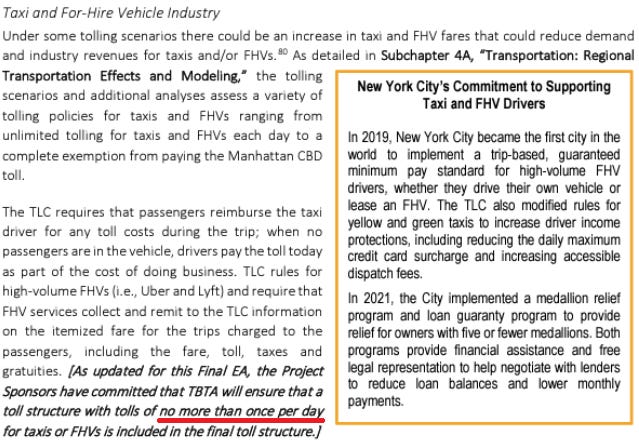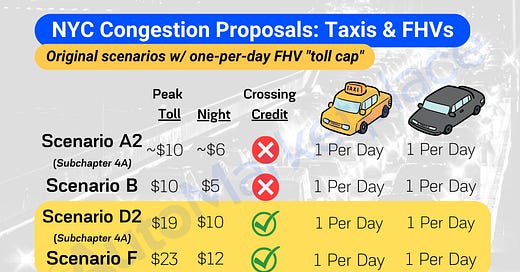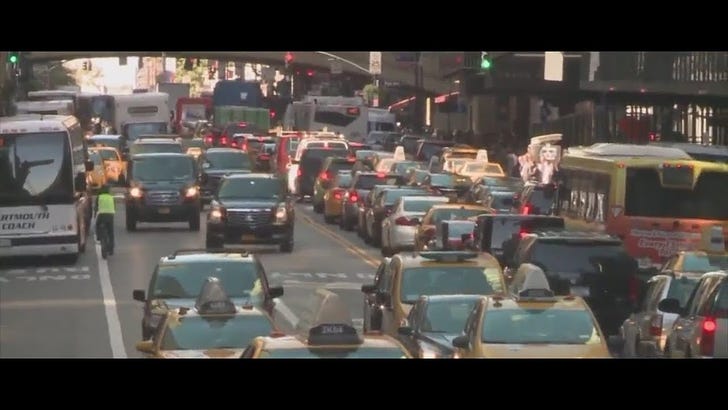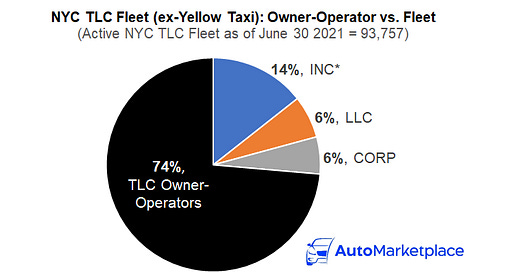

Discover more from AutoMarketplace
🚦 Yellow Cabs & FHVs To Pay New Congestion Toll ONCE Per Day
Latest congestion pricing plan, launching in mid 2024, calls for taxis & TLC-plated vehicles to be charged ONCE a day. Partial concession is less controversial, but still viewed as double taxation
Final congestion tolling proposal calls for yellow cabs and other TLC-plated vehicles to be charged once per day
Partial concession is less controversial, but many still view additional congestion tolls as a form of double taxation
Congestion Pricing is entering final phase before formal implementation in mid-2024
As NYC’s long-debated congestion pricing plan nears implementation by mid-next year, its final structure is becoming clearer. While exact toll amounts have not been determined, there was (somewhat) welcome news for the NYC for-hire transportation industry.
“We all know that the yellow cab industry has been struggling and that, in combination with some other variables, led us to say we’re going to only charge the taxis and FHVs once per day even if they’re going in and out of the congestion zone.”
- MTA Chair & CEO Janno Lieber
The latest MTA, State and City transportation departments Environmental Assessment (EA) report calls for a once-per-day cap on charges for taxis and for-hire vehicles (FHVs). What’s unclear is whether this only applies to NYC TLC-regulated taxis and FHVs or all taxis and FHVs (e.g., Newark Taxis, Westchester FHVs) entering Manhattan below 60th St.

As a reminder, NYC taxis and other for-hire vehicles (FHVs) are already subject to $2.50 and $2.75 per trip congestion surcharges, respectively. EVEN WITH the once-per-day “cap”, taxis & for-hire vehicles will still likely make up a large portion of total congestion toll revenue .
The existing fees generated more than $1 billion for the MTA in their first three years, according to the Taxi and Limousine Commission.
- THE CITY
How Much Will The Toll Be?
The final toll amount(s) will be recommended by the six-member Traffic Mobility Review Board and voted on by the MTA over the next weeks/months. However, based on our understanding of, and prior analysis, it appears that original Environmental Assessment (EA) Scenarios A2, B, D2, F & G2 would be most similar to the latest EA. In fact, Scenarios D2 & F, which included crossing credits, would be the closest scenarios, in our opinion, to the final EA proposal for NYC FHVs.
Below we share an updated graphic, with these five scenarios. The prospective daily “peak tolls” NYC yellow cabs & FHVs would need to pay range from $10 to $23. Notably, the “once-per-day” scenarios that included ‘crossing credit’, had a peak congestion tolls that ranged from $19 to $23! 👀 Remember, this is on top of the existing per congestion surcharges mentioned above.

Timeline & Implementation?
After the MTA Board approves the final version of the Central Business District (CBD) Tolling Program, the last steps would mostly revolve around technical implementation. It appears around April 2024, if all goes to plan, NYC congestion tolling would officially go into effect.
For NYC Congestion Tolling to work as envisioned, a system would need to be in place that charges vehicles entering Manhattan below 60th St, with the notable exception of vehicles driving on the West Side Highway (9A), FDR Drive, Battery Park Underpass and/or “any surface roadway portions of the Hugh L. Carey Tunnel (a/k/a Brooklyn-Battery Tunnel) connecting to West Street”. That’s a pretty complex task, but other large cities with congestion tolling, like London, Stockholm or Singapore, may provide a helpful roadmap.

According to the MTA’s official website on the Central Business District Tolling Program, “The toll would be paid using an E-ZPass. If you do not have an E-ZPass, toll bills would be mailed to the address of the registered vehicle owner and are paid using Tolls by Mail.”
Uber, Lyft & Taxi Industry React
Uber, Lyft and the yellow cab industry had different reactions to the announcement that all TLC-plated vehicles would be subject to a once-per-day congestion toll.
Uber struck a more measured diplomatic tone, while Lyft expressed concerns about logistics, arguing drivers would ultimately be on the hook for the toll. The New York Taxi Workers Alliance (NYTWA), the City’s largest yellow cab driver union, still believes medallion taxis should be totally exempt. The Independent Drivers Guild (IDG), a large rideshare driver advocacy group, believes all NYC FHVs deserved to be exempt from additional congestion-related surcharges.
All major FHV groups still believe additional congestion tolling on FHVs represented a form of double taxation given the existing per trip surcharges. A rare incidence of industry consensus across all FHV sectors.
“While pleased it’s finally moving forward, the once-a-day cap only attempts to satisfy the federal government’s economic justice concerns…Now, as required by law, it’s time for the MTA to factor in taxi and FHV’s existing congestion surcharge before setting the toll amount, if any, for taxis and FHVs.”
- Uber statement
“The MTA’s solution for rideshare would be an infeasible logistical nightmare. There is no way for companies to know if a driver has already passed through the congestion zone by giving a ride on another platform or ride service…It would fall on the driver’s shoulders to pay the fee. Instead of burdening drivers further, the MTA should acknowledge that our industry has for years already paid them a congestion pricing fee and focus on ensuring the program is funded fairly across all who use our roadways.”
- Lyft statement
“Drivers should absolutely not have to pay a dime of the fee…Given already existing reporting requirements to the [Taxi & Limousine Commission]…Lyft and Uber should have the means to figure it out…Yellow cabs should be exempt entirely. Once a day is still thousands of dollars a year for struggling drivers”
- New York Taxi Workers Alliance statement
“Rideshare drivers were already charged a congestion tax in the first phase of congestion pricing. It is unfair to add another congestion tax on these drivers – and it also violates federal law by disproportionately harming minority and low-income population…To double tax those who can least afford it is obscene and puts the livelihood of thousands of low-income, immigrant rideshare drivers in jeopardy. The MTA should leave the status quo in place for the drivers, and reassess in a few years.”
- Independent Drivers Guild (IDG) statement
There is undoubtedly more to come on NYC Congestion Pricing, a historic event in not only NYC’s but the nation's transportation history. Although New Jersey might seek to block or delay its implementation, probability favors NYC congestion tolling being implemented by next year.
We will keep our readers informed and up to date with new developments.
1 Minute Summary
As always, let us know your thoughts in the comments section below or by emailing us at info@automarketplace.com.
AutoMarketplace NYC covers the for-hire transportation industry and automotive news. Check out AutoMarketplace on YouTube ▶️












I was mulling this announcement and article last night and I am relieved that drivers with riders in their vehicle will not pay the proposed congestion pricing of $19-$23 peak toll, which is proposed for once a day. That being said, I wholeheartedly agree with the Lyft statement: how does the rideshare company know whether or not you already paid your congestion pricing for the day and, more importantly, let’s say they do figure out a way to find out this information, do you now only match riders in the outer boros with drivers that already paid their daily congestion price so as to not charge the passenger? Does that mean drivers who didn’t pay their daily congestion price will be like the ugly red-headed stepchild and not get any rides because the rider would have to pay an extra $19-$23?
On a privacy level, do I want rideshare companies knowing my driving patterns by having access to information on my EZ-PASS account because if they need to know whether or not I was Manhattan, they will have that information. I see it as the start of an encroachment into information I may not want rideshare companies to have access to. If we start this process of giving out EZ-PASS information, what is to stop rideshare companies from knowing whether or not you were paid already to enter New Jersey, for example. If I was paid $20 bridge/tunnel toll by Uber to go from NYC to NJ and now (due to sharing of EZ-PASS information) Lyft knows they don’t have to pay me $20 to go back into NYC, but I need that $20 if only because the NJ rideshare rates are too low and it helps add to my earnings.
Rider share drivers are already been charged congestion fee & it will not be fare for double charging the same tax for an individual. Hope authorities may kindly look into the matter seriously & consider